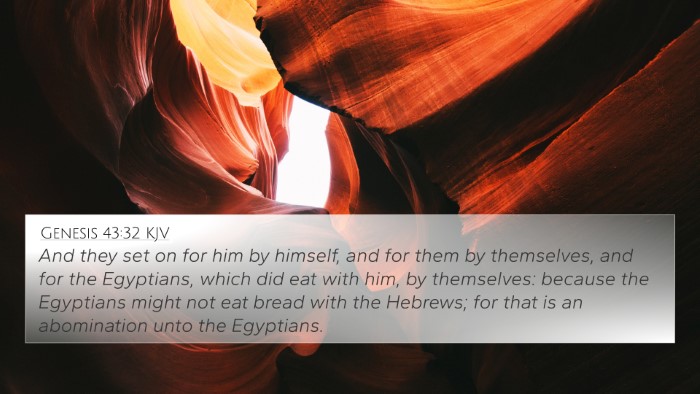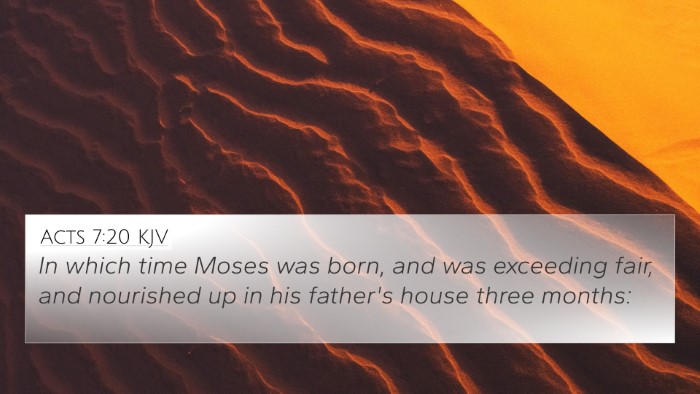Meaning and Interpretation of Genesis 39:6
Genesis 39:6 states:
"And he left all that he had in Joseph's hand; and he knew not ought he had, save the bread which he did eat. And Joseph was a goodly person, and well favored."
This verse presents several important themes and ideas worth exploring, as derived from the public domain commentaries by Matthew Henry, Albert Barnes, and Adam Clarke.
Overview
In this passage, we see Potiphar, an officer of Pharaoh, trusting Joseph with everything he possesses, indicating Joseph's integrity and capability. The verse also highlights Joseph's character, describing him as a "goodly person" and "well favored."
Main Themes
- Trust and Responsibility: Potiphar's complete trust in Joseph signifies Joseph's reliability and good character. It illustrates the importance of being trustworthy in positions of responsibility.
- Divine Favor: Joseph being described as "well favored" suggests that he has not only physical attractiveness but also that he is favored by God, a theme prevalent throughout Joseph's life.
- Abundance: The mention of Potiphar knowing only the bread he eats emphasizes the abundance in his household due to Joseph's management.
- Character Development: This verse marks a significant moment in Joseph's life where he is beginning to rise in status, foreshadowing his eventual elevation in Egypt.
Commentary Insights
From Matthew Henry, we learn that Joseph's success is not merely due to his skill but is also attributed to God's favor. Potiphar's ignorance of his own possessions indicates a level of trust but also points to the challenging nature of the life of a steward.
Albert Barnes emphasizes that Potiphar was fully confident in Joseph’s abilities. This confidence stems from Joseph’s previous experience and God’s providence in his life, which is essential for understanding the role of divine sovereignty in human affairs.
Adam Clarke points out the dual meaning of “goodly” and “well favored,” suggesting not only physical attributes but also moral character, which is central to understanding Joseph's impact on those around him.
Bible Verse Cross-References
This verse can be connected to several other scriptures that enhance understanding and provide a broader view of Joseph's journey:
- Genesis 37:3: Joseph's favor with his father mirrors the favor he now finds in Potiphar's house.
- Genesis 41:46: Highlights Joseph's rise to power, linking back to his trustworthiness throughout his narrative.
- Proverbs 22:29: "Seest thou a man diligent in his business? He shall stand before kings." This reflects Joseph's diligence.
- Psalms 105:19: This verse reminds us of the significance of Joseph's trials, affirming that God was with him even in hardship.
- Luke 16:10: "He that is faithful in that which is least is faithful also in much," relating to Joseph's faithfulness in service.
- Galatians 6:9: Encouragement not to be weary in doing good, echoing Joseph's perseverance.
- 1 Peter 2:19-20: Discusses suffering for righteousness, connecting to Joseph's unjust trials.
Connections Between Bible Verses
The thematic Bible verse connections are profound in this context. The narratives of trust and integrity demonstrated by Joseph are echoed in later scriptures that highlight the attributes of a faithful servant of God. The mention of physical appearances can also draw parallels to biblical discussions on inner versus outer beauty, underscored in scriptures such as 1 Samuel 16:7, where God looks at the heart rather than appearance.
Application of Insights
In contemporary Christian life, this verse encourages believers to reflect on their own characters and integrity. Joseph's life exemplifies that trustworthiness leads to leadership opportunities. The verse can be utilized as a foundational reference in sermon preparation on topics such as faithfulness, trust, and God's providence.
Conclusion
Genesis 39:6 serves as a cornerstone for exploring the complexities of character, trust, and divine favor. As we engage in cross-referencing Biblical texts, we uncover deeper narratives and insights that are applicable to our lives and faith journeys. Understanding the connections between Bible verses can enrich our study and offer a more profound appreciation of the scriptures.














